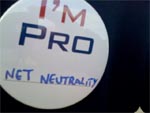In all the wrangling over how we should define broadband, I wanted to step back and remember why the definition is important.
Information networks have become essential for business, education, and entertainment. The broadband definition originally meant something faster than the dial-up speeds that topped out at 56kbps. In the late 90’s, any connection faster than dial-up pretty much supported all Internet activities.
Over the years, some connections got faster while the slower connections were expanded to more people across the United States. In 2009, people who remain stuck with dial-up would be happy to get the slow speeds that first became available when DSL and cable modems debuted. On the other hand, many no longer consider those connections (often in the neighborhood of 200kbps to 768kbps for download speeds and even slower for upload speeds) to be capable of supporting many modern applications.
When the broadband definition supported all the applications users wanted to run, it was useful for subscribers. However, as the broadband definition has lagged farther and farther behind modern applications, it has become only useful to large companies like Comcast, AT&T, Verizon, and Qwest because they could brag that they were delivering"broadband" to most of their customers.
Read the entire discussion at MuniNetworks.org, an ILSR site dedicated to municipal networks and community broadband.



